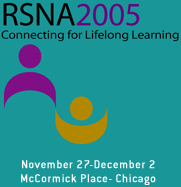
Abstract Archives of the RSNA, 2005
Michael Ronald Chinander PhD, Presenter: Nothing to Disclose
Robert Mark Nishikawa PhD, Abstract Co-Author: Nothing to Disclose
We have previously developed a model of a radiographic
phosphor screen in order to create simulated mammograms. In this study we investigated the addition of scatter and film noise components to improve the accuracy of the model.
A monte carlo-based scatter point spread
function (PSF) available in the literature was convolved with the
input x-ray distribution images to determine that amount of
scatter. We used a PSF which corresponded to a 4 cm thick breast and 5
cm diameter field of view. The resulting scatter to primary ratio
(SPR) and change in contrast was used to the evaluate the effect of
adding scatter and compared to expected values. Film grain noise was
added to the simulation output images by generating zero-mean gaussian
white noise with the variance of the noise dependent upon the local
optical density. The film grain noise was filtered with the noise
transfer function of the film prior to adding it to the output image.
A high resolution, low noise radiographic image of cadaver breast
tissue was also used as input to the simulation and compared to a
radiograph of the cadaver breast using a conventional mammographic
screen film system.
The SPR of the simulation agreed well with the expected
value, within 6% of the expected SPR. The addition of scatter resulted
in a reduction in contrast by 22% as expected by theory. The standard
deviation of a region from the simulated mammogram was within 11% of the
standard deviation of the corresponding region from the screen film
mammogram.
The addition of scattered radiation and film grain noise
improves our model to produce simulated the mammograms. The simulated
mammograms more closely match the noise and contrast characteristics
of real mammograms.
Chinander, M,
Nishikawa, R,
Improving the Contrast and Noise Characteristics of Simulated Mammograms. Radiological Society of North America 2005 Scientific Assembly and Annual Meeting, November 27 - December 2, 2005 ,Chicago IL.
http://archive.rsna.org/2005/4413236.html

